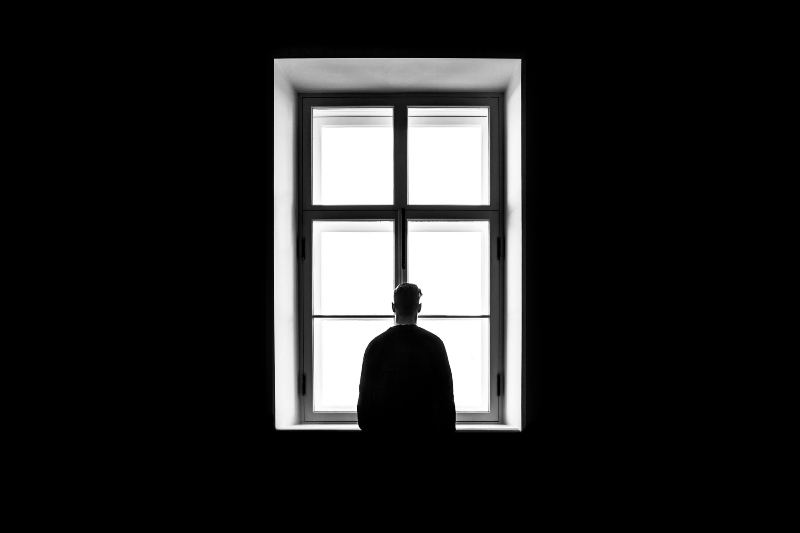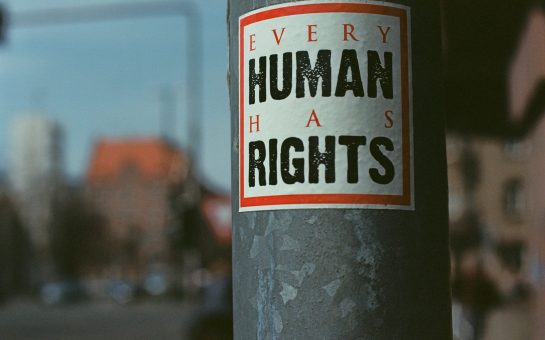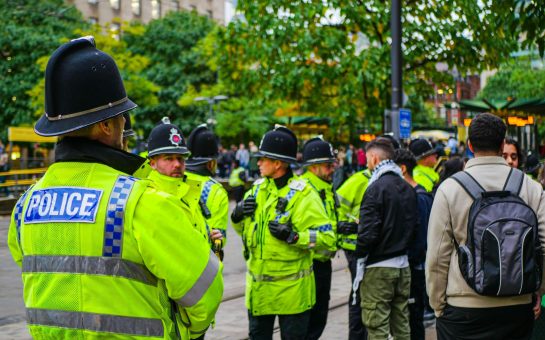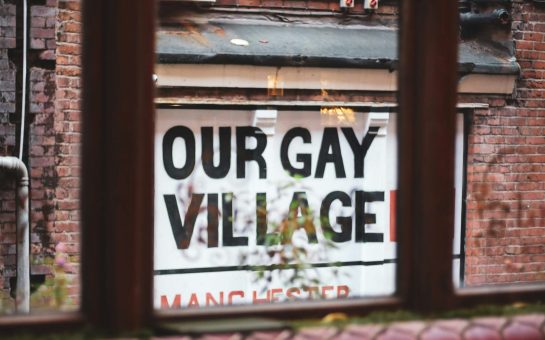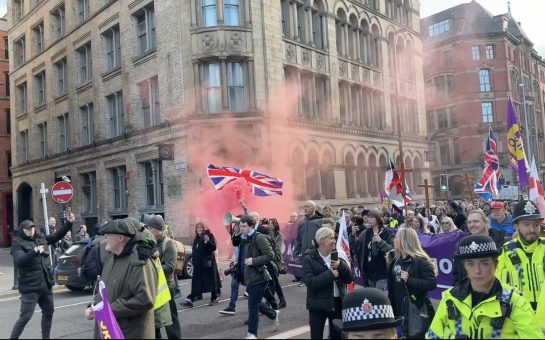The number of reports of rape made by men has dramatically increased in Greater Manchester – so is this a light at the end of the tunnel for male survivors? We spoke to three male survivors about reporting.
After being raped in 2019, Freddy* did not go to the police.
His friends – who knew the other person involved – encouraged him not to. They said they didn’t want to pick a side. And then, over time, they faded away.
“I was explicitly told by one person that you shouldn’t report,” he said, “because people will view it as ‘You’re just some guy who’s had a meet go wrong and immediately went to the police and no one’ll want to do anything with you any more’.”
Freddy did reach out for support – to his university support services. But they were unqualified to deal with a male survivor and referred him to the local Rape Crisis centre. Some Rape Crisis centres deal with male survivors, but others only deal with girls and women – including the one Freddy was referred to.
It was only two years later, after he’d had more time to process it all, that he reported the incident to the police.
And in that, Freddy wasn’t alone. The number of male survivors of rape who are reporting to Greater Manchester Police (GMP) has risen sharply – it was eight times as high in 2023 as it was 10 years earlier.
GMP’s statistics, received through a Freedom of Information (FOI) request, show that the total number of reports made by male-identifying individuals rose from 228 in 2013 to 1966 in 2023.
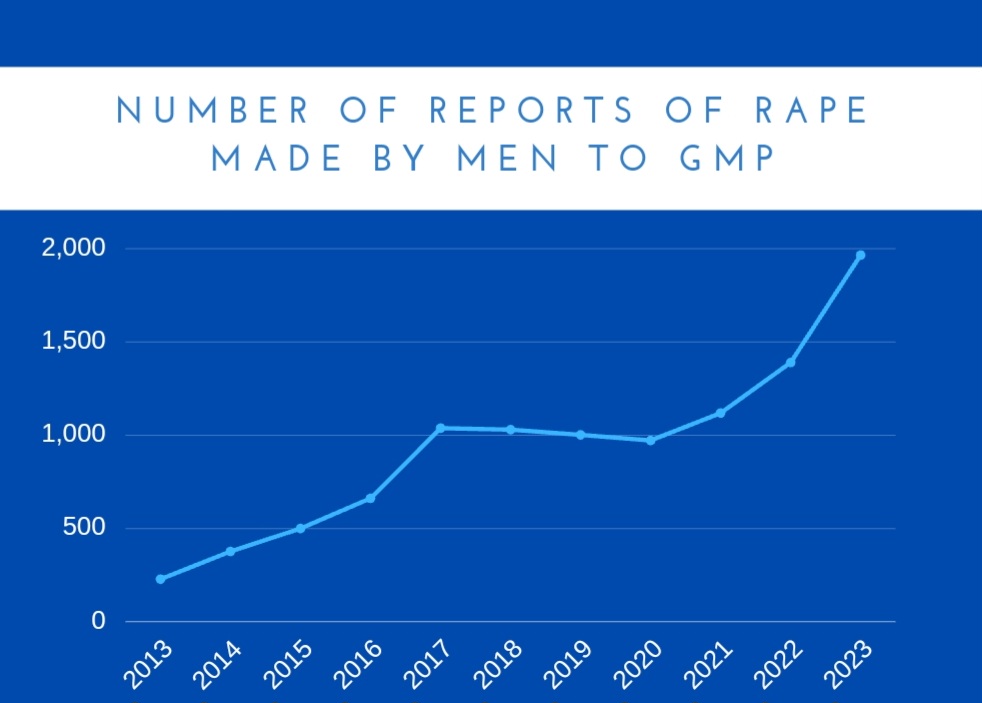
The age group with the highest increase in reports was 46+ year-olds – with over 60 times as many reports in 2023 than 2013, going from five reports to 309.
This stark increase suggests that more middle-aged and older men are becoming comfortable reporting, which could be due to a shift in gender norms and expectations of traditional masculinity over the last decade.
On the other end of the age spectrum, with the highest reporting rates over the entire ten-year period, was under-16-year-olds.
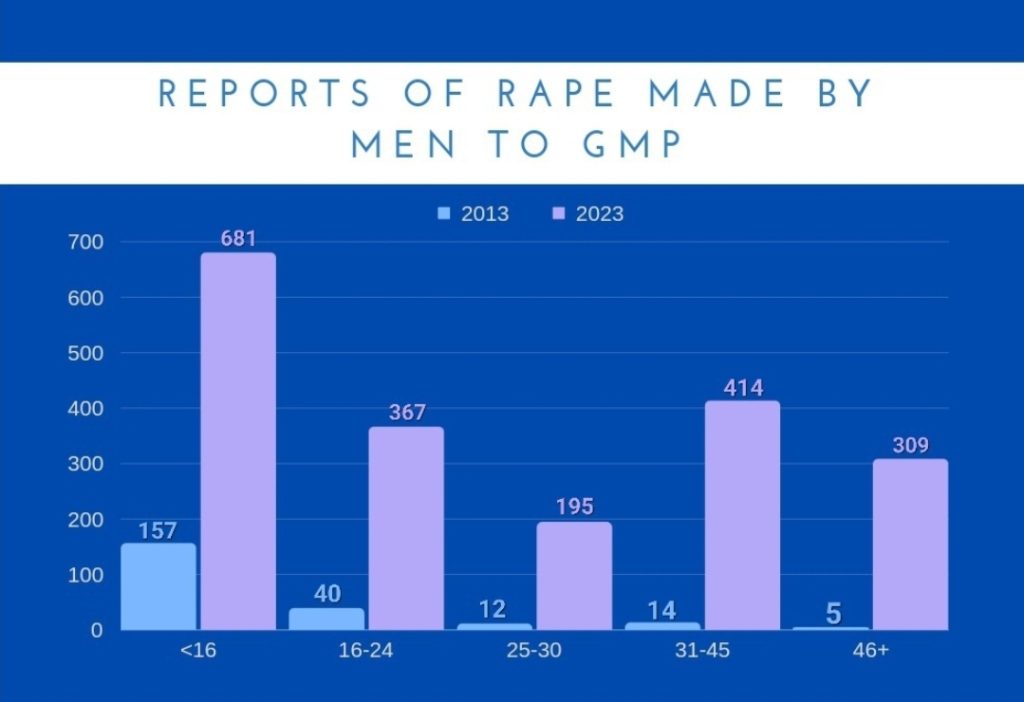
Another notable thing the data revealed was a dip in reports from 2019 to 2020 – presumably due to lockdowns and Covid regulations.
The overall rise in reports demonstrates that more male survivors feel comfortable coming forward now than they did ten years ago.
Yet despite the increase in reports, there are still male survivors who never go to the police.
Jake* is one of these survivors.
“I blamed myself”
Jake was raped in 2017 and never reported it.
At the time he did not feel like he could talk to anybody about the rape, let alone go to the police.
He said: “I blamed myself and I didn’t want anybody to know I let this happen to me.”
Many victims of rape and sexual assault often blame themselves.
This fear of somehow having been responsible for what was done to them can actively deter survivors from seeking support or going to the criminal justice system.
Jake said: “I’m glad more people are reporting but looking at the statistics makes me wonder how many more guys are out there who, like me, didn’t come forwards, didn’t report and didn’t have that support.”
Seven years after the events, Jake’s outlook has changed.
He no longer blames himself and has become more comfortable speaking to others about his experiences but feels that it is now too late to go to the police.
“When that blame shifts, something inside you shifts. I could finally open up and I don’t feel alone any more.”
While he has spoken about the topic to others, this has not always been a positive experience for him.
He said: “When you’re a guy who has had this happen to him, the reactions are never predictable. Some people are great, some people – well, some people just aren’t.
“While I’d love to be able to be a louder voice for male victims, I don’t feel like the way our society is built allows for every survivor to talk about it candidly.”
He explained that he often felt actively deterred from talking about his own experiences because of how ‘male rights activists’ use male survivors as a way to downplay female experiences.
One group’s experience does not diminish another’s – both can and should be spoken about without downplaying the other.
Many male survivors, Freddy and Jake included, believe that male and female survivors have very different experiences and that the support they get should be based on this rather than one form of support being given to all.
This is why charities like Rape Crisis having women-only centres is actually a positive thing: it offers a safe space for women and girls to access the support they need.
But incidents such as Freddy’s do show that there is a lack of awareness for which services are available to men and which are not.
Greater Manchester Police told MM: “GMP promote referrals to partner agencies such as We are Survivors, SARC, Rape Crisis, Independent Sexual Violence Advocates and Victim Support in relation to male victims of rape and sexual assault” – and additionally mentioned Migdal Emunah, a support service for Jewish men, women and children.
GMP stood by this even after it was pointed out that Manchester Rape Crisis is for women – it describes itself as a “women only service”.
One support service that is specifically for male survivors is Survivors UK, which is dedicated to supporting men and non-binary people in their healing journeys.
“It’s a leap of faith”
Author, poet, performer and survivor Tanaka Mhishi is a trustee for Survivors and runs workshops around consent, sexual violence and intersectionality with a focus on how creativity can be helpful when tackling such difficult topics.
Tanaka also wrote Sons and Others: On Loving Male Survivors, a non-fiction book about the male experience and society’s approach to men who have experienced rape.
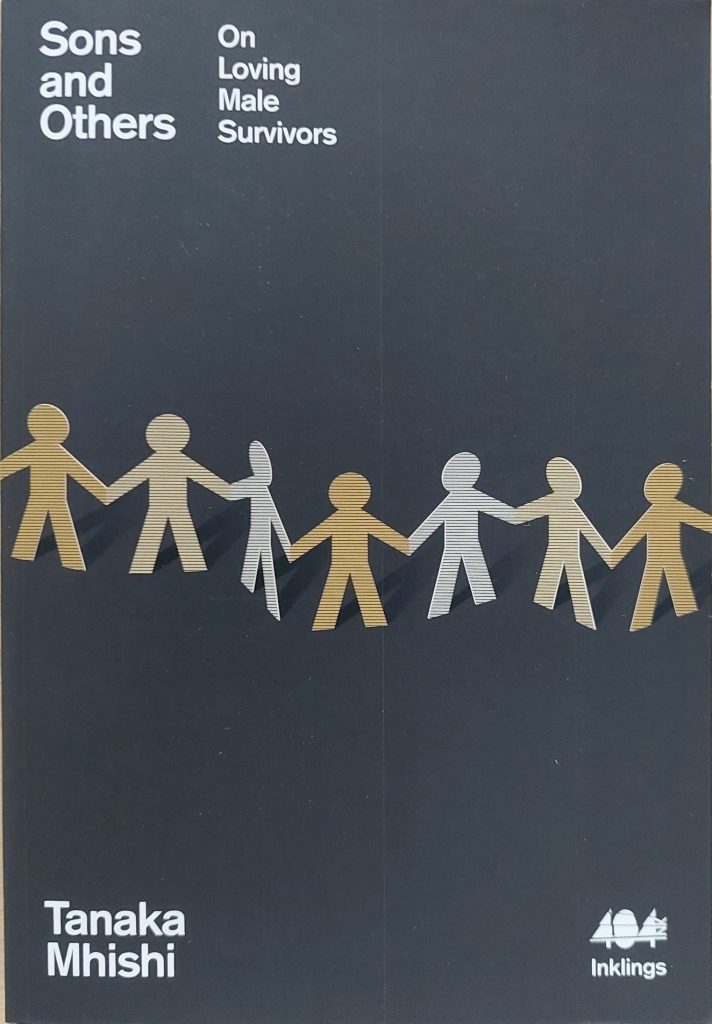
In his book Tanaka writes about his own rape and his experience with the criminal justice system as well as what he has seen throughout his support work and activism.
While Tanaka reported straight away, he understands why not everybody does so.
Many male survivors do not feel comfortable coming forward about their experiences due to societal pressures.
He said: “A lot of what we’re still taught even in progressive forms of masculinity is that the worst you can be is a burden.
“I know a lot of men who have this huge fear that if they say, ‘I’m a survivor of sexual violence’, that will change or end the relationships that they’re in.
“It can be really hard to speak up when you feel like there isn’t any help or support because then you’ve exposed yourself, you’ve been vulnerable and your society or the people in your life have turned around and said, ‘No, we don’t want that from you’ – which is devastating to anyone but particularly around a subject this hard and close to the foundation of who we are.
“In so many ways it’s a leap of faith with really high stakes either way.”
Tanaka spoke about his own experience and how fortunate he was to have a strong support network around him while he went through the process.
He explained that he thinks everybody should have this but that he knows many men through his work who have not been as fortunate.
He added: “And that for me is in many ways almost a greater injustice than the assault itself – because if you have the community, you can build your life back to something very much worth living, and if you don’t then that’s a hell of a lot harder.”
Support networks
So, with the dramatic increase of reports, is reporting to the police the be-all and end-all?
Tanaka thinks not.
He said: “I think more people reporting is good, more discussion is good – but we sometimes think about this a little bit backwards.”
Regardless of whether someone reports instantly, reports later or never reports, the conversations with these three survivors made it clear that a support network is key in overcoming these experiences.
Creating an environment in which male survivors can speak openly about their experiences and get the support they need is a crucial element to keep men reporting.
Tanaka added: “Reporting rates aren’t the be-all and end-all, because what happens after – that is really important.”
*names have been changed
If you or anybody you know has been raped, there is support out there.
We Are Survivors: “A survivor focused voluntary sector organisation that aims to create and facilitate safe spaces for male (including trans and non-binary individuals) survivors of sexual abuse, rape and sexual exploitation across Greater Manchester.”
Website: wearesurvivors.org.uk
Email: [email protected]
Helpline: 0808 500 2222
Socials: @ThisIsSurvivors
Survivors UK: “We support male and non-binary survivors of sexual violence, providing counselling, practical help and community on your healing journey.” This charity works out of London but offers remote and in-person support.
Website: survivorsuk.org
Email: [email protected]
Number: 0203 598 3898
Socials: @SurvivorsUK (X) @survivorsukcharity (Instagram)
Saint Mary’s Sexual Assault Referral Centre (SARC): “SARC provides a comprehensive and coordinated forensic, counselling and aftercare service to men, women and children living in the Greater Manchester area.”
Website: stmaryscentre.org
Email: [email protected]
Hotline: 0161 276 6515
Male Survivors Partnership: “Our goals are to secure prevention, healing and justice for men and boys through research, advocacy and capacity building.”
Website: malesurvivors.co.uk
Helpline: 0808 800 5005
Socials: @MaleSurvivorUK (X) @malesurvivorspartnership (Instagram)
Feature image by Sasha Freemind
